
This National School Counseling Week, we aren’t just celebrating the incredible work of school counselors; we are celebrating the partnerships that make their work possible.

This National School Counseling Week, we aren’t just celebrating the incredible work of school counselors; we are celebrating the partnerships that make their work possible.

Children First Fund (CFF) expands its Board with leaders from KPMG and Power Construction, bringing new expertise and passion to support Chicago Public Schools (CPS) students and strengthen community partnerships.

Children First Fund (CFF) is excited to welcome two accomplished education leaders to our Board of Directors to help advance our mission of promoting the success of Chicago Public Schools (CPS).
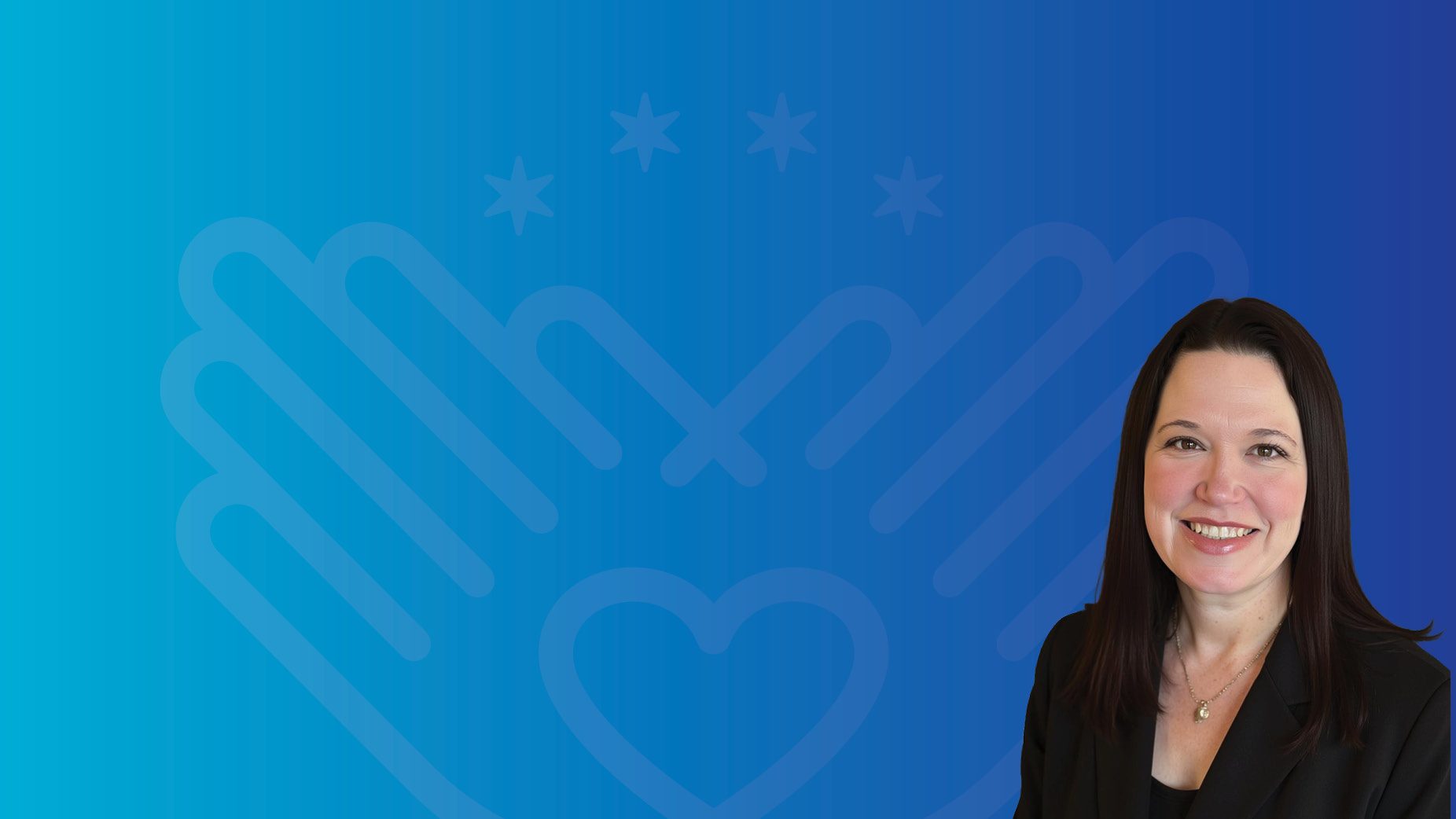
The Children First Fund (CFF) is excited to welcome Rebecca Clarkin as our new Executive Director. She joined our team this week, bringing a wealth of experience in nonprofit leadership and a deep commitment to supporting children and families.
For over two decades, Rebecca has worked in prominent Chicago social service organizations that support children and young people. Rebecca spent the last decade at Youth Guidance, most recently as their Chief Operating Officer. She spearheaded the public-private partnerships that helped transform Youth Guidance from a small Chicago organization to a significant partner to Chicago Public Schools and an increasingly national organization operating in eight cities.
Youth Guidance focuses on supporting schools and students that need the most support, an approach that is shared with CFF. Her career-long commitment to young people and unwavering focus on unleashing their potential and strengths is inspiring.
Prior to her time at Youth Guidance, Rebecca served in leadership roles at Brightpoint (then Children’s Home & Aid) and Little City Foundation, two of Illinois’ most prominent social service agencies. Ms. Clarkin began her career connecting young families in Head Start programming in Chicago’s Englewood community to nonprofit partners for additional services, a role which had a profound impact on her commitment to serving children and families in underserved communities in Chicago.
At Children First Fund, we are grateful for the partnerships that made recent accomplishments possible within the CPS academic core, educator development, college access, career connected learning, physical and behavioral wellness targeted students supports, and school partnership and family crisis response, and we are excited about this next chapter for CFF. Our students and school communities are the beneficiaries of the most dedicated, thoughtful, and engaged community of partners.
We hope you will join the CFF Board, CFF Managing Directors Yemisi Odedina and Mica Matsoff, and the rest of the CFF team in welcoming Rebecca to the Children First Fund.
Alan King
Chair, Children First Fund Board
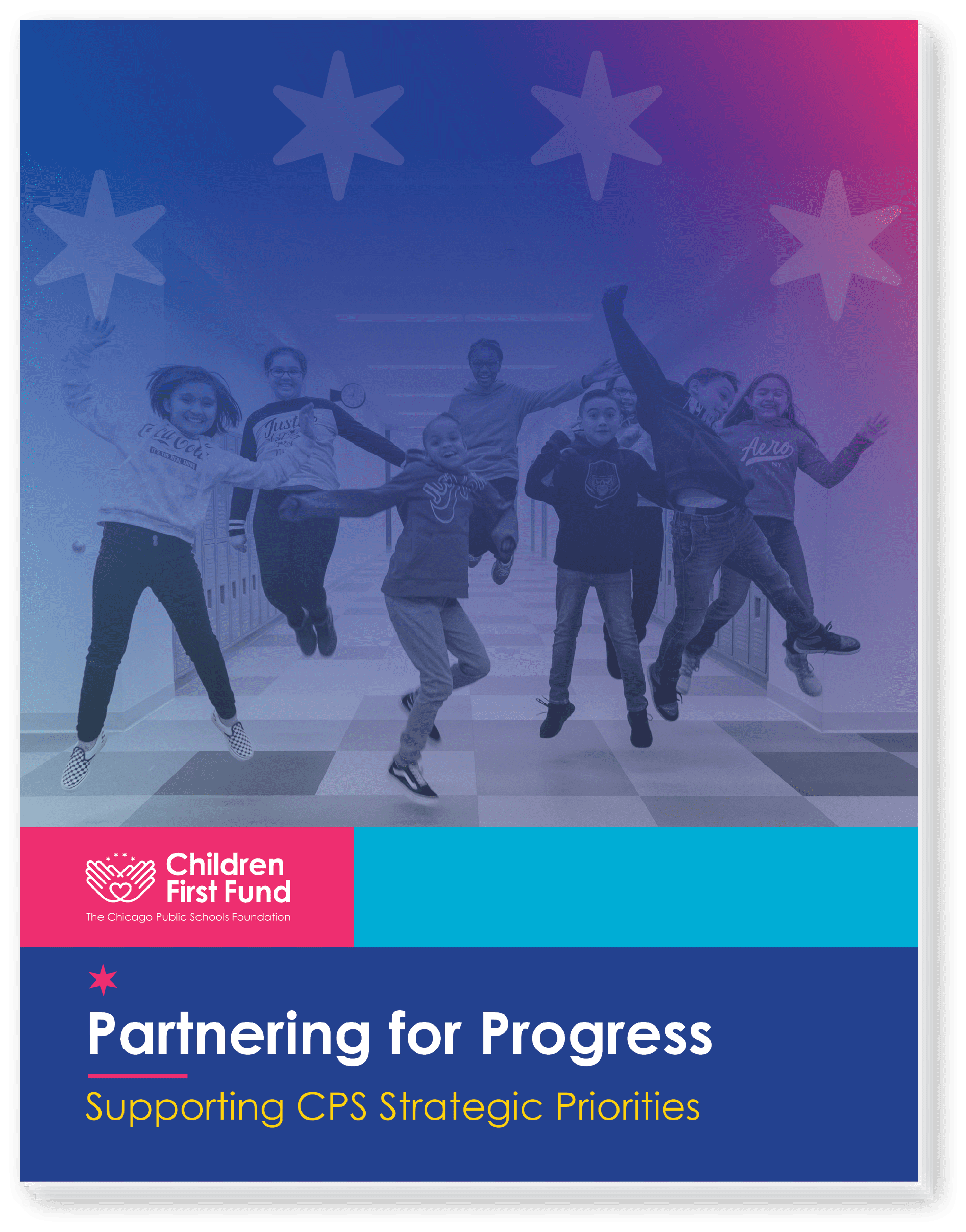
At Children First Fund (CFF), we are driven by a shared commitment to create a brighter future for students, families, and educators at Chicago Public Schools (CPS). As the CPS foundation, our mission is to bridge the gap between talent and opportunity, leveraging external resources to ensure that every student has the support they need to thrive.
In alignment with the new CPS Five-Year Strategic Plan, Success 2029: Together We Rise, we have worked closely with the CPS community to prioritize philanthropic funding requests that represent the most critical needs and highest-impact opportunities to support CPS students and schools in achieving our strategic goals.
After evaluating the many existing funding opportunities, we’ve prioritized initiatives that not only align most directly with District goals, but also adhere to lessons learned from successful philanthropic partnerships of the past. CFF’s Partnering for Progress outlines these key priorities, and highlights the unique opportunities for foundations, corporations, individuals, and organizations to partner with CFF and CPS. This is not an exhaustive list of opportunities, so we welcome the chance to explore additional ways to support our students and schools with you.
Together, we can continue to make a meaningful difference in the lives of CPS students and help build a stronger, more equitable future for our city.
A special message to those who have supported CPS over the previous five years: Thanks to you, we have raised over $78 million and an additional $14 million in in-kind donations for the District, and provided support to more than 400 elementary schools, 120 high schools, and 35 Central Office teams, through more than 1,600 grants and contributions from generous foundations, corporations, and organizations, and gifts from more than 3,100 individual donors of all giving levels. You have bolstered funding for programs that touch all aspects of the student experience, from health and safety to core academics and college and career access and readiness.
The meaning of your support extends beyond the resources you have provided. You have shown our school leaders, teachers, and students that you are rooting for them, have confidence in their abilities, and are invested in their present and future success.
And the impact of your partnership—a critical piece of the puzzle along with the dedication of CPS leaders, educators, and students—is clear. CPS schools have seen record-breaking gains, ranking first in reading growth and third in combined reading and math growth in 2023 among large urban districts. Our 2024 state assessment reports show continued gains, and our graduation rates are climbing. The CPS Class of 2024 graduated with more than 55,000 college credits.
Now, we look ahead to the next five years to continue to build partnerships that will ensure bold and transformational changes in our students’ lives, with a focus on those who have historically been farthest from opportunity.
We invite you to explore these opportunities and consider how your support can help advance our shared mission. Thank you for your ongoing commitment to Chicago’s students and families. We look forward to working together to make a lasting impact.
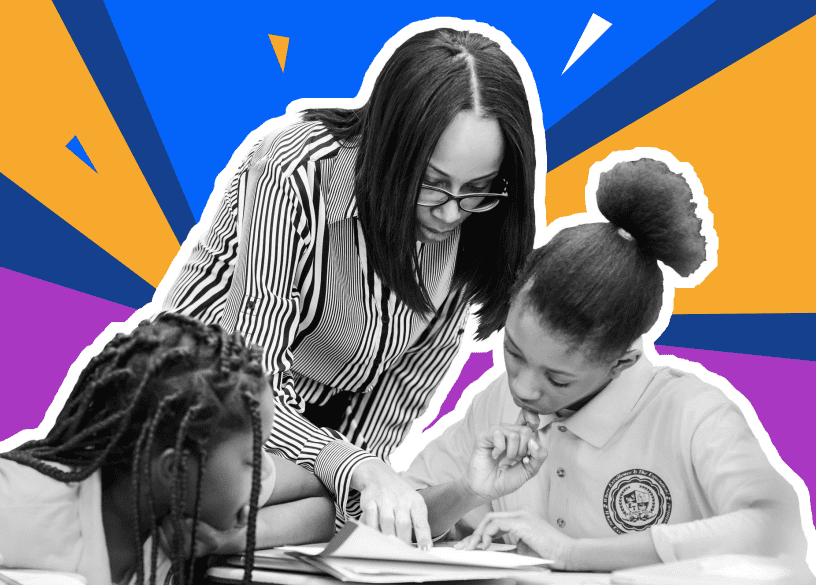
Informed by a new study and supported by CFF partners, Chicago Public Schools’ Opportunity Schools Initiative is expanding to provide dedicated teacher recruitment and retention support to more schools
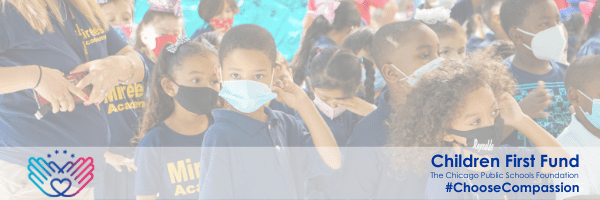
As Chicago Public Schools kicked off the 2021-22 school year, CFF and our partners were on the ground across Chicago, supporting back-to-school efforts, providing resources from the Compassion Fund to remove barriers to students reengaging with learning, and bringing additional enthusiasm and energy to the exciting back-to-school season.
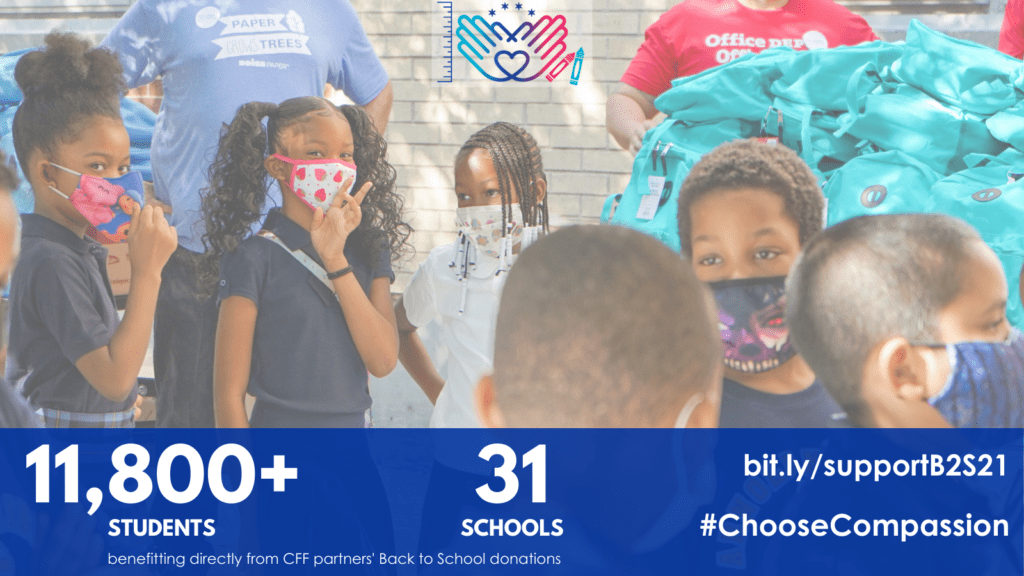
Here are just a few examples of our school communities’ enthusiasm and the impact of our partners’ generosity as CPS students headed back to school:
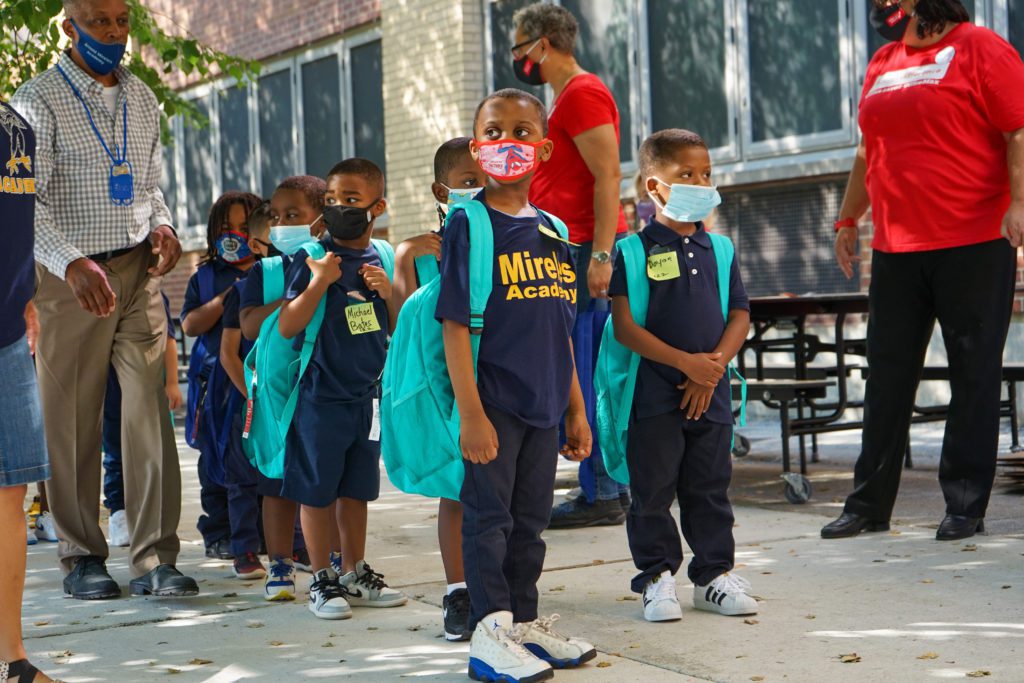
Students at Arnold Mireles Elementary started their school year off proud, with brand new backpacks and school supplies provided by Office Depot and Boise Papers. These partners’ Start Proud! initiative equipped 1,000 students at 3 elementary schools to thrive this year.
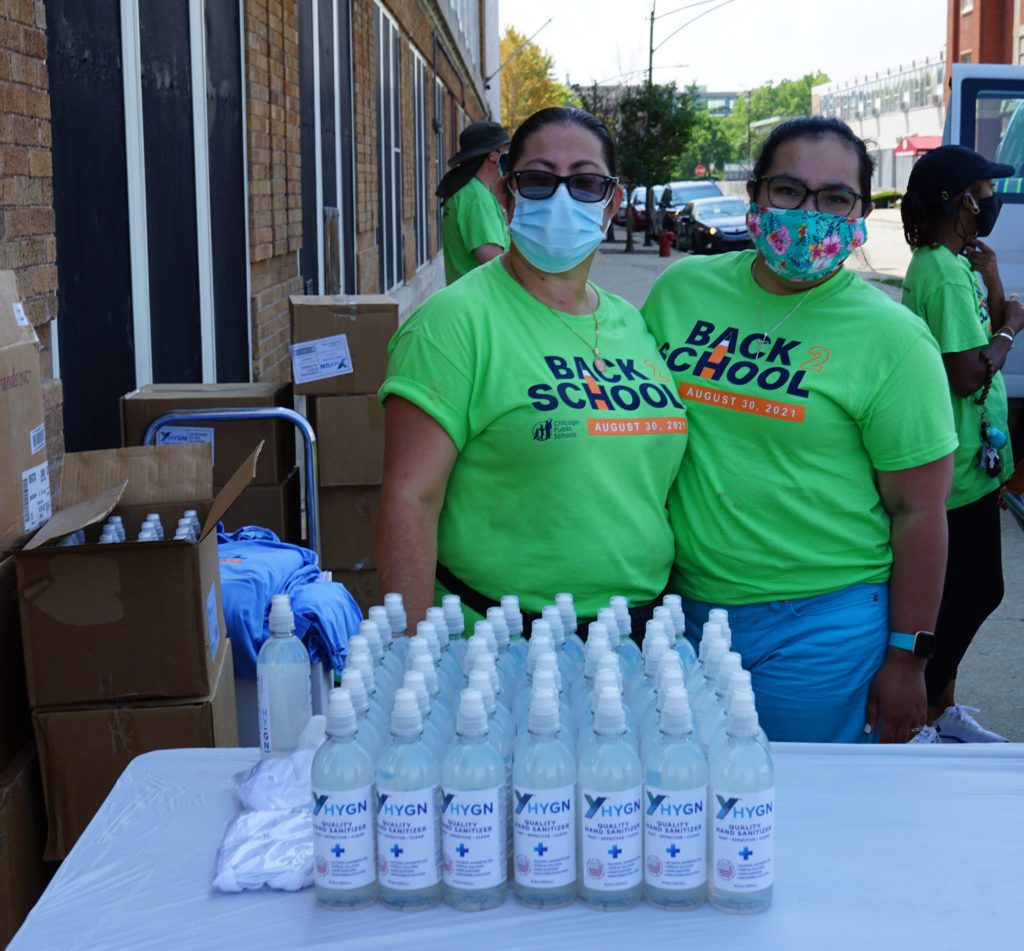
Students and families entering CPS Back to School Bashes were greeted with cheerful faces and ample amounts of PPE, much of which was donated by CFF partners. Partners providing essential PPE to supplement CPS’ substantial investments included Bank of America, Grainger, Home Depot, SC Johnson, along with many more.
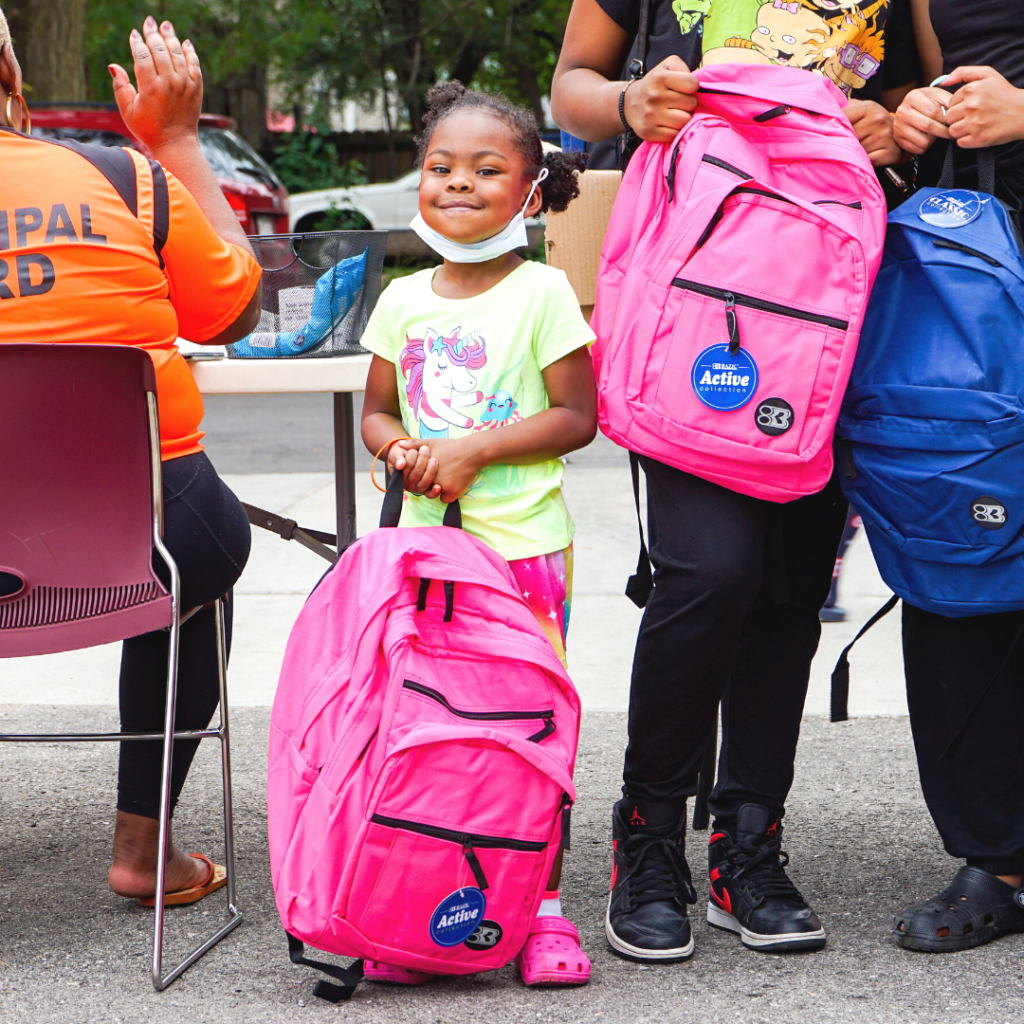
Cradles to Crayons donated 10,000 backpacks and a trove of other school supplies, making sure every student at 22 different CPS schools started the year with new materials and increased confidence.
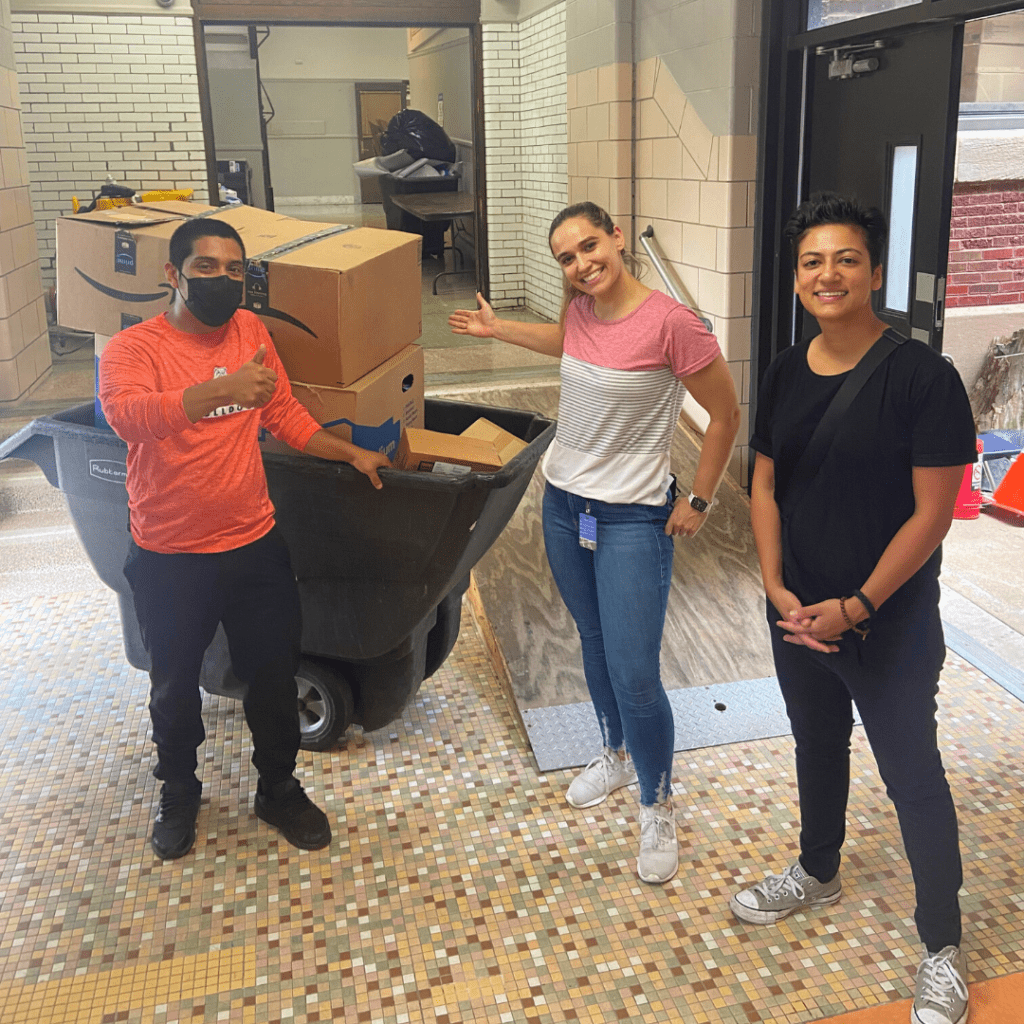
Uber Freight‘s Chicago team donated and delivered essential school supplies to Piccolo Elementary.
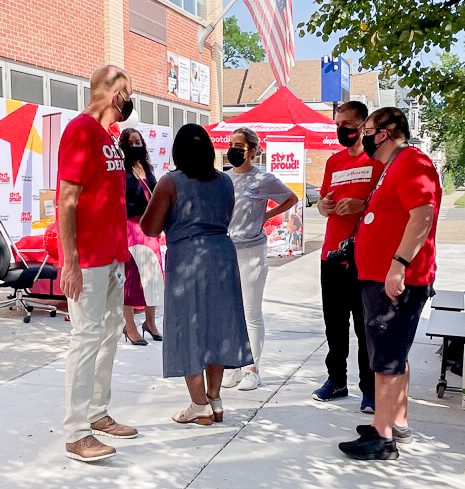
Team members from Office Depot, CPS Network 12, Mireles Elementary, and CFF confer on preparations for the StartProud! back to school event.
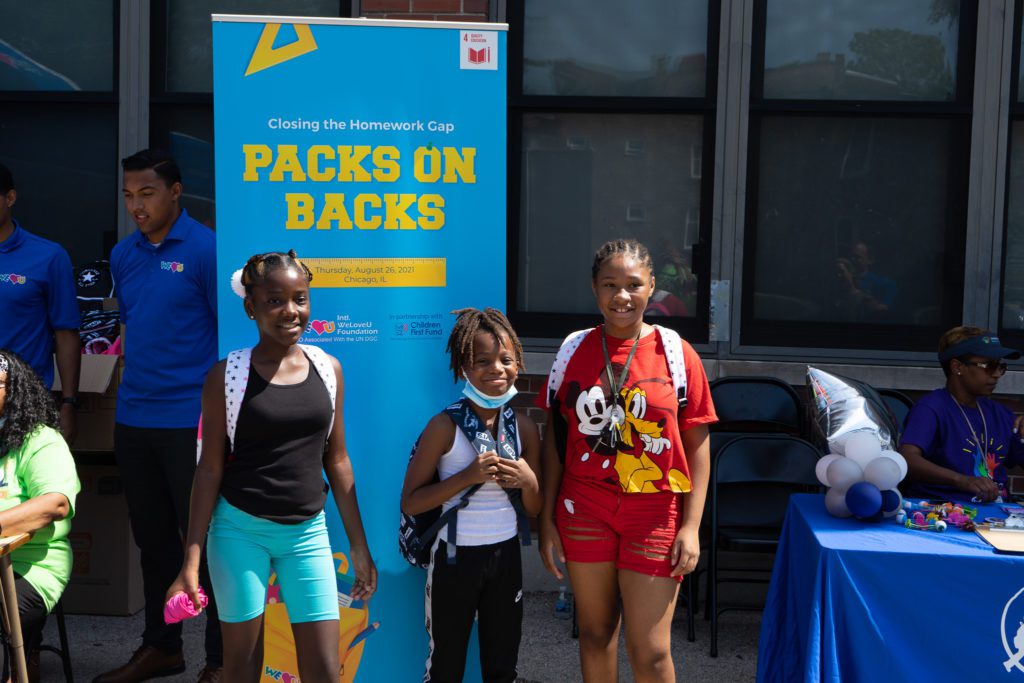
The International WeLoveU Foundation brought backpacks, supplies, and tons of enthusiasm to Spencer Elementary’s back-to-school cookout where students had the opportunity to meet their new teachers before the start of the school year.

Section 8 Chicago – the Independent Supporters’ Association (ISA) for the Chicago Fire Soccer Club – activated their supporter community’s enthusiasm to collect and distribute school supplies for Dr Martin Luther King Jr Academy of Social Justice in Englewood.
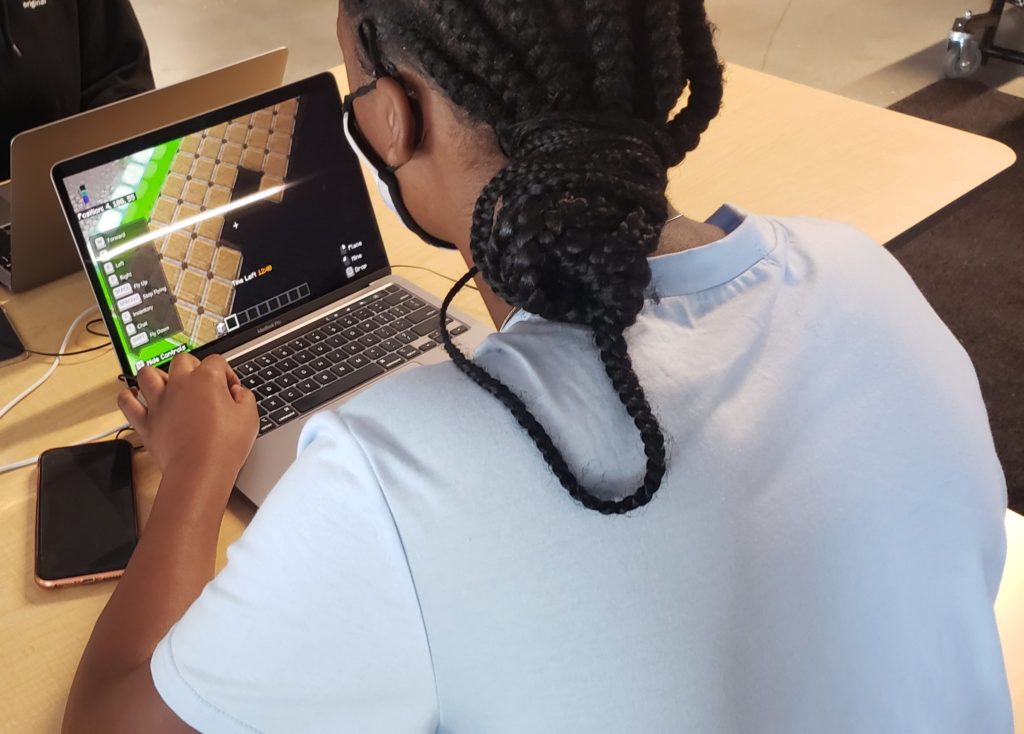
This summer, an all-girls team (new to #MinecraftEDU) won 1st place at the #Chitown Showdown, an esports competition hosted by CPS’ Early College and Career Office and the Department of Computer Science. CME Group Foundation supported this event and 5 others like it, funding an esports pilot for our CPS students as they reengaged with STEM learning and readied themselves for the school year.
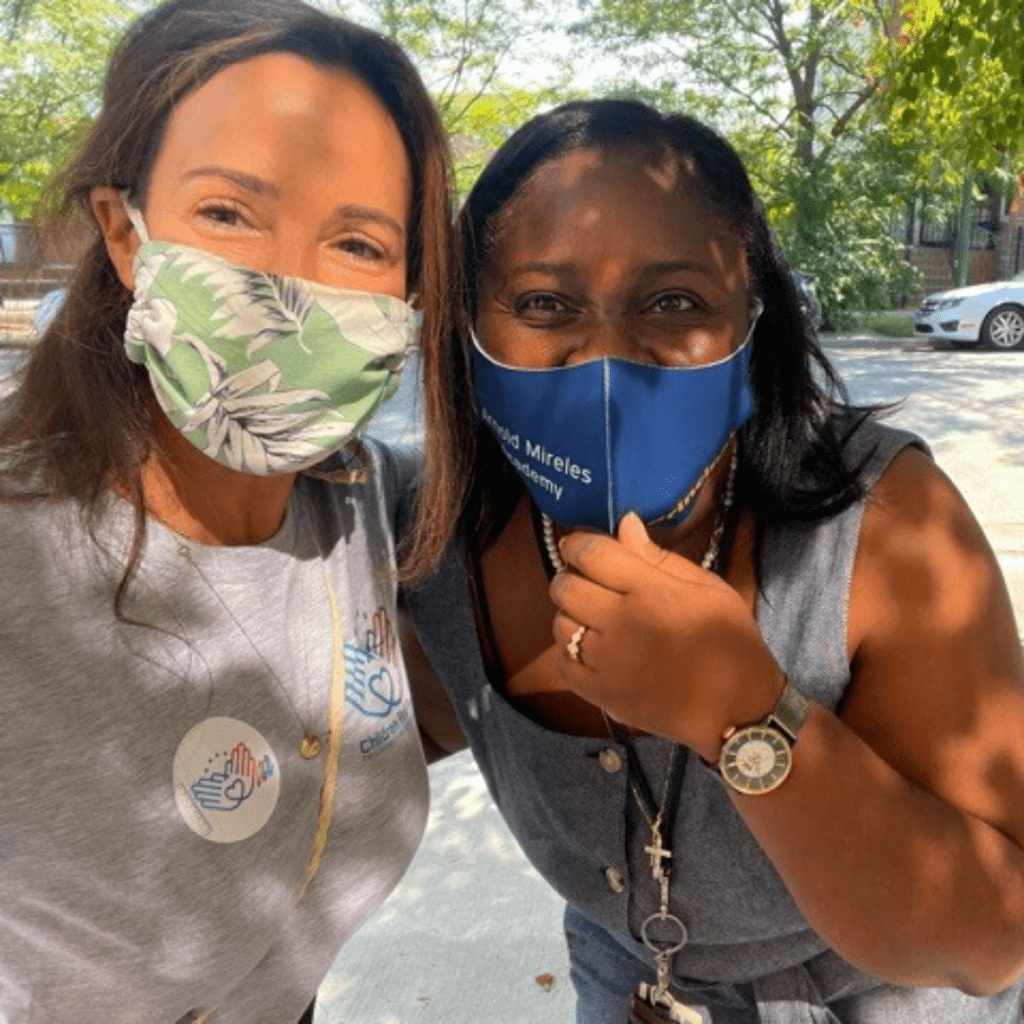
Principal Randle-Robbins of Mireles Elementary in South Chicago, with Mica from CFF.
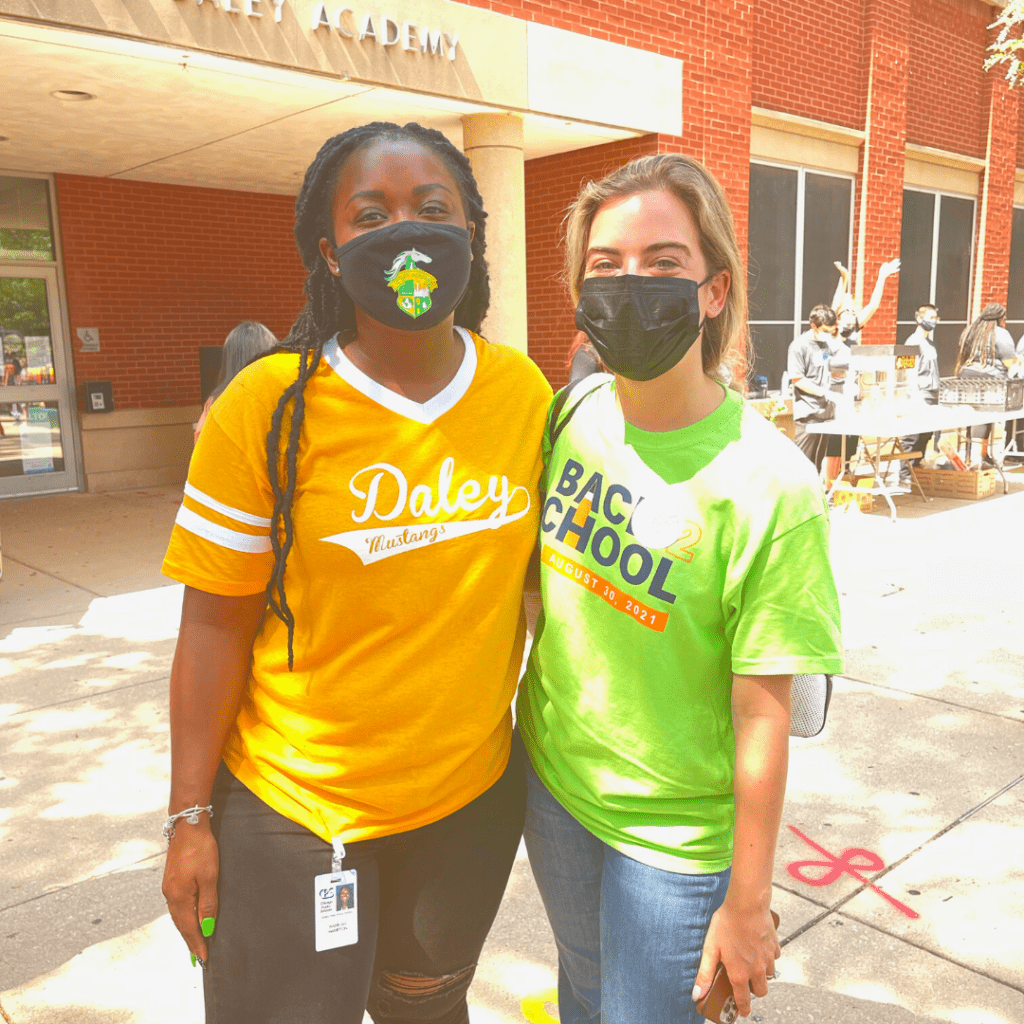
CFF at Daley Elementary‘s back-to-school event, visiting a longtime partner and helping with distribution of Cradles to Crayons’ backpack donation.

CFF visited schools to help with back to school efforts. Here’s Sadie, our ED, at Hitch Elementary in Jefferson Park.
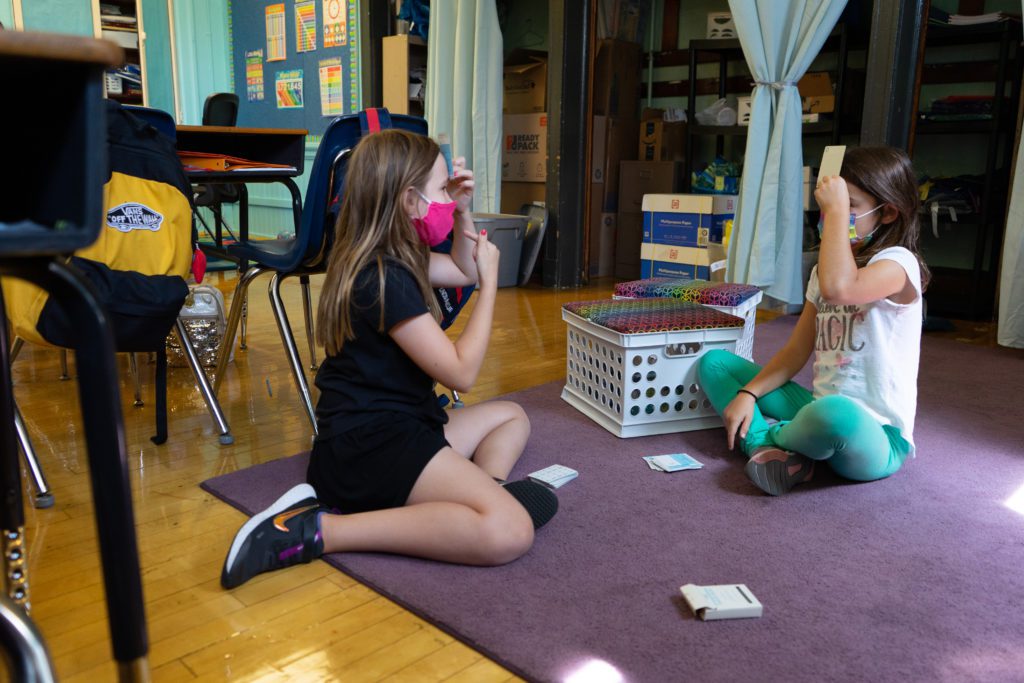
CFF visited Ravenswood Elementary and saw students and teachers finding creative ways to collaborate and interact while maintaining social distance.
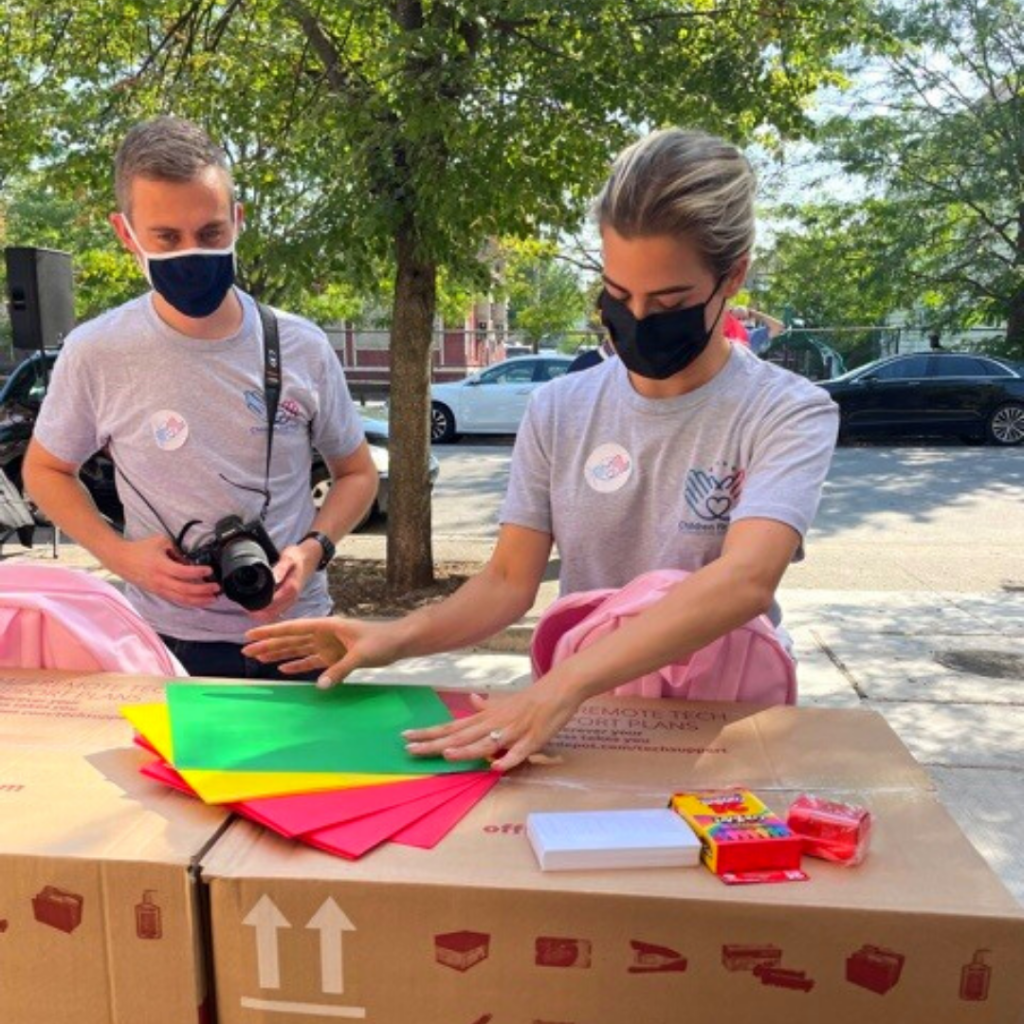
CFF team members Hutton and Luke organize school supplies at a donation distribution event during the first week of school.
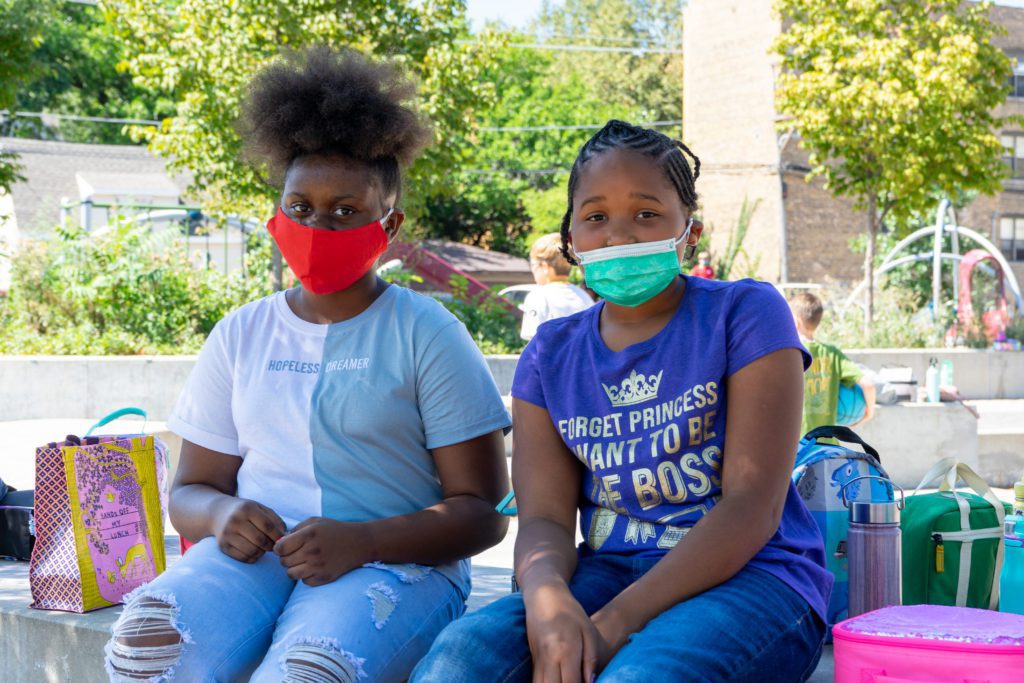
Ravenswood students enjoy lunch outdoors.
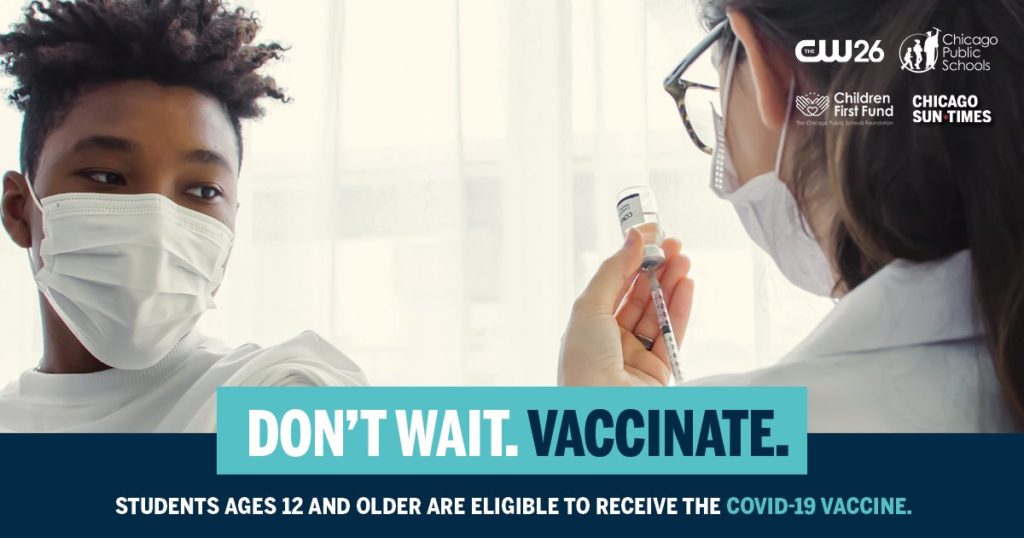
| In partnership with the Chicago Sun Times, WCIU, and CW26, CPS and CFF initiated a campaign to raise awareness for COVID-19 vaccinations, emphasizing the availability of the vaccine for students ages 12 and older. |
To continue to support CPS school communities, please consider donating in these ways:
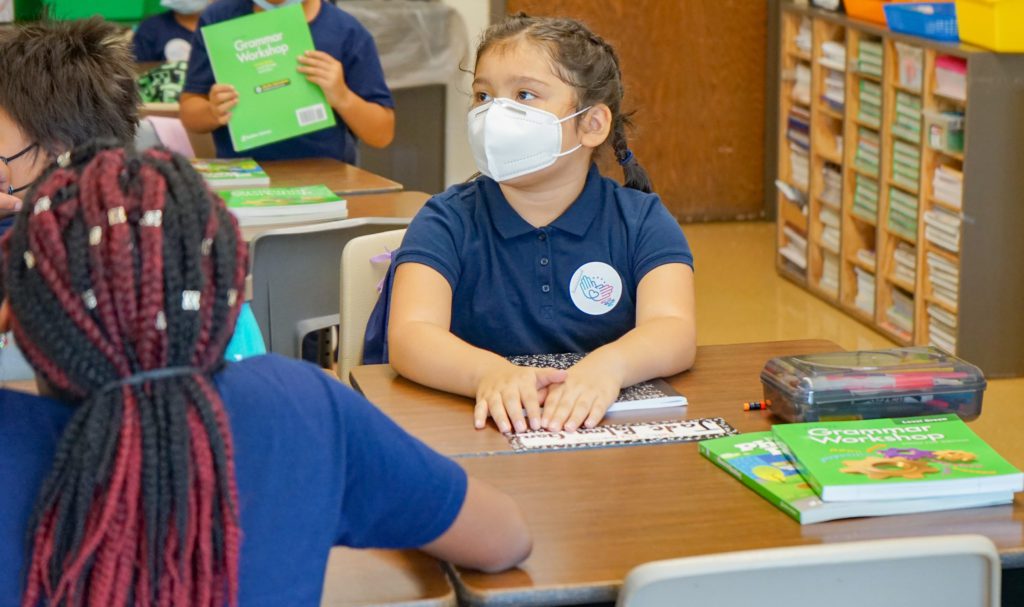
While we can’t predict what this new year has in store, we know students look to schools for far more than academics –– and that our schools rely on the Compassion Fund to address unexpected circumstances.
Our partners’ generosity helps equip our schools to weather the challenges of tomorrow. As students and families encounter various needs, thanks to the support of our community, we’re able to provide resources to help our students and schools succeed.
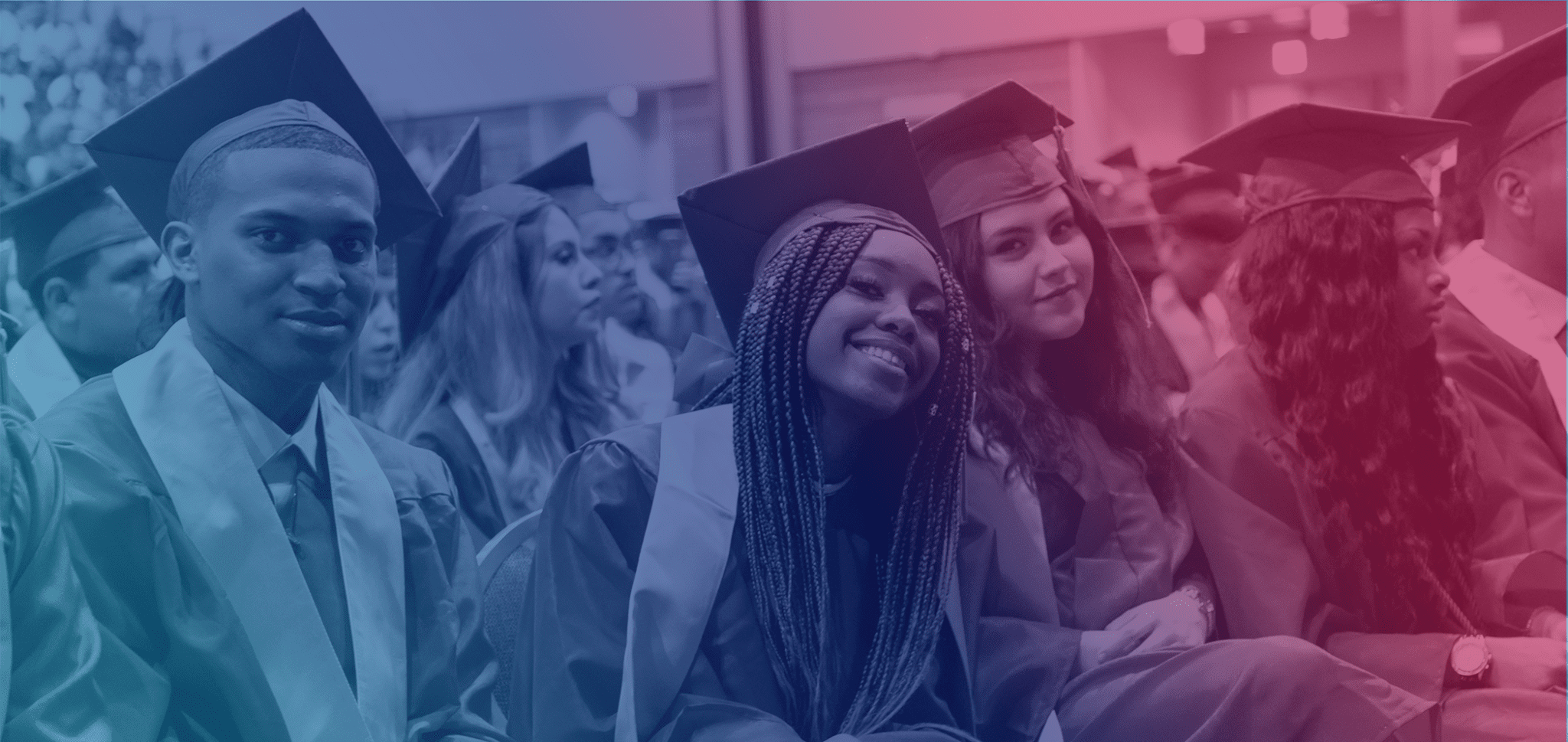
In Chicago’s Albany Park neighborhood, Saray spent the 2020-21 school year navigating the everyday challenges of a first-year college student: balancing studies and social interactions, learning how to manage her time with greater independence, and tackling initial courses in her chosen discipline (for her: pursuing a Nursing degree).
But she also had a whole slate of challenges that many college students experience but many others do not: figuring out the complexities of a university and parsing financial aid policies as the first in her family to attend college, and helping care for four younger siblings while her parents juggled work schedules and financial stressors. All this in a global pandemic, which made even “everyday” challenges much more daunting. Through it all, she persevered – and excelled.
Saray isn’t alone in her determination or success. In steadily increasing numbers, Chicago Public Schools students are planning for, pursuing, and succeeding in postsecondary education.
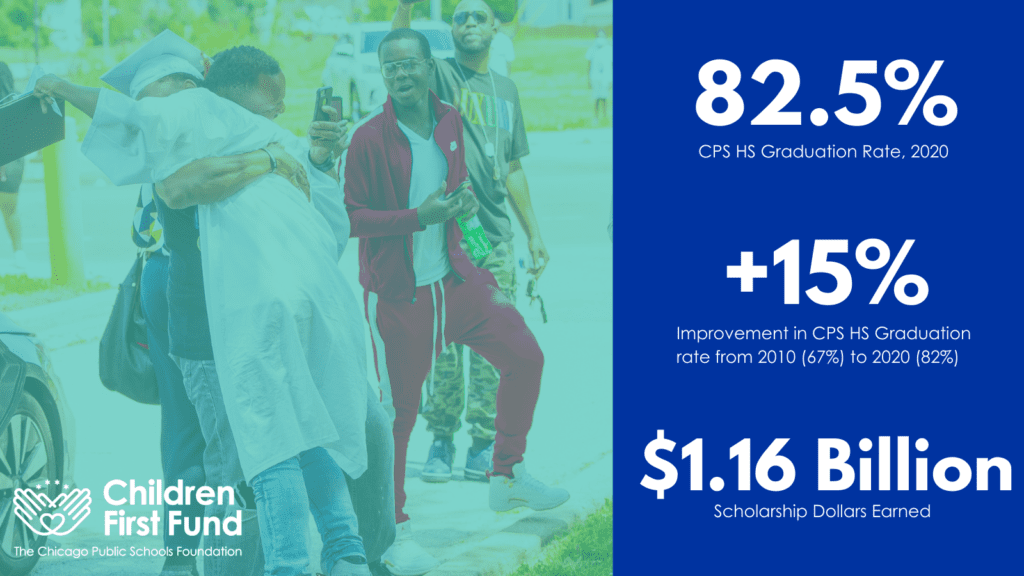
At the same time, students face complicated and unfamiliar challenges to obtaining their desired postsecondary credentials and careers. Chief among them: rising educational and personal costs, multi-faceted family responsibilities, and the continued fallout from the COVID-19 pandemic.
In response, CFF developed the Compassion Fund’s postsecondary access program, partnering with CPS Office of College and Career Success (OCCS) to provide resources supporting graduating seniors (and those recently graduated) beginning in spring 2020 and throughout the 2020-21 school year. The power of timely, targeted emergency aid is well-documented, especially for students from backgrounds of limited financial means. Oftentimes, a few hundred dollars can mean the difference between a student matriculating directly to a postsecondary institution or stalling (and, more often than not, permanently discontinuing) their educational journey.
Students and the school communities who support them have navigated an array of challenges, meeting COVID-era transitions to postsecondary education with resilience, flexibility, and determination. Educators and CPS leaders responded to student needs identifying and expanding the needed, targeted supports. Philanthropic partners including Crown Family Philanthropies, PepsiCo, and Fifth Third Bank Foundation contributed college success funding – emphasizing equity, empathy, and rapid-responsiveness in their generosity.
CPS Counselors, College & Career Specialists, and Network and Central Office staff worked nimbly, building a nomination system and aid application review process from scratch. CFF contributed fundraising, project management, and financial expertise to assemble necessary resources and get them to the students who needed them most.
The results were remarkable – at a macro level, 338 students received an average of $432 in emergency financial relief. These funds provided laptops for students who suddenly had to learn remotely when they’d planned to utilize on-campus resources, bus tickets for student transportation to orientations and move-in days, and covered mandatory enrollment fees or other financial hurdles to students’ education.
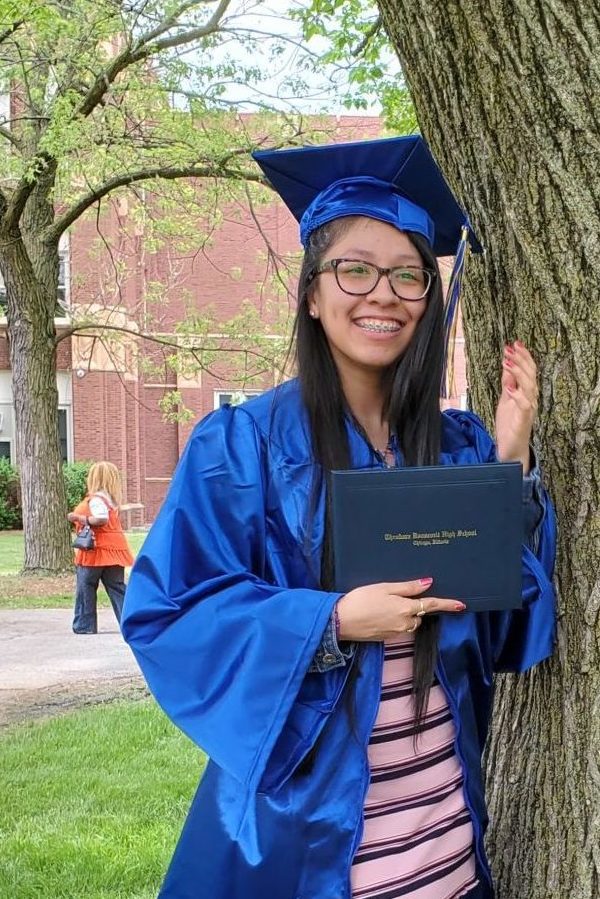 Saray was one of these students. Graduating in 2020 with a successful high school record, she’d been admitted to her first choice school – North Park University, located only a few short blocks from her family’s home. But then the pandemic hit, and money became even more scarce in her household. A relatively small balance (at least compared to the overall cost of attendance) of $1,008 remained after her financial aid package. Even with a monthly payment plan, this burden felt nearly insurmountable.
Saray was one of these students. Graduating in 2020 with a successful high school record, she’d been admitted to her first choice school – North Park University, located only a few short blocks from her family’s home. But then the pandemic hit, and money became even more scarce in her household. A relatively small balance (at least compared to the overall cost of attendance) of $1,008 remained after her financial aid package. Even with a monthly payment plan, this burden felt nearly insurmountable.
Throughout her summer before college and into her freshman year, Saray maintained contact with staff at her CPS high school, and with “Ms. Jenny,” the College & Career Specialist supporting postsecondary efforts at her school. Hearing of the financial obstacles to Saray’s postsecondary plans, this team encouraged her to apply for CFF’s postsecondary success funds, and then connected her with the additional resources from the Continued Transition program. It’s hard to say who smiled widest – Saray, her mother, or Ms. Jenny – when they saw her bursar balance’s updated total: $0. A few weeks later, Saray even received a refund of the payment they’d already cobbled together for their original installment plan. With these funds, she covered the cost of a textbook and online fees for another class – yet another expense she had yet to figure out how to pay.
OCCS devoted significant time and resources to these efforts, and simultaneously collaborated with CFF to get additional funds to students, creating an initiative directing additional advising and financial support to a cohort of schools, thanks to the generous donation of another longtime CFF partner. OCCS’ Continued Transition program also garnered positive results, especially in re-engaging students who’d indicated plans to attend college but hadn’t immediately matriculated in the fall of 2020.
Meeting diverse and specific needs is messy, complicated work. Making this large-scale postsecondary success a reality for students involved educators and administrators tracking packages across Chicagoland to help students locate their pre-loaded debit cards, problem-solving for families with unstable and shifting financial circumstances, and anticipating unique needs of transient populations such as Students in Temporary Living Situations (STLS). In more than one instance, someone had to meet or reroute USPS deliveries.
All of this labor and dedication provided invaluable support, advising, and personal connection points — vital to encouraging students, caring for their social and emotional well-being, and helping them navigate a complicated life-transition in an unfamiliar landscape. But the impact went beyond advice and encouragement thanks to the generosity of our philanthropic partners. Meeting needs both social-emotional and practical/financial has the potential to dramatically improve students’ educational and professional trajectories. For hundreds of CPS ’20 graduates, our philanthropic partners recognized and supported that transformative potential firsthand.
Thanks to our partners’ continued generosity, these enhanced supports are again available to CPS students graduating in 2021. Having seen the immense impact of these postsecondary success funds for our alumni, we hope to replicate and expand this initiative in years to come.
—-
Interested in supporting CPS students’ continued success?
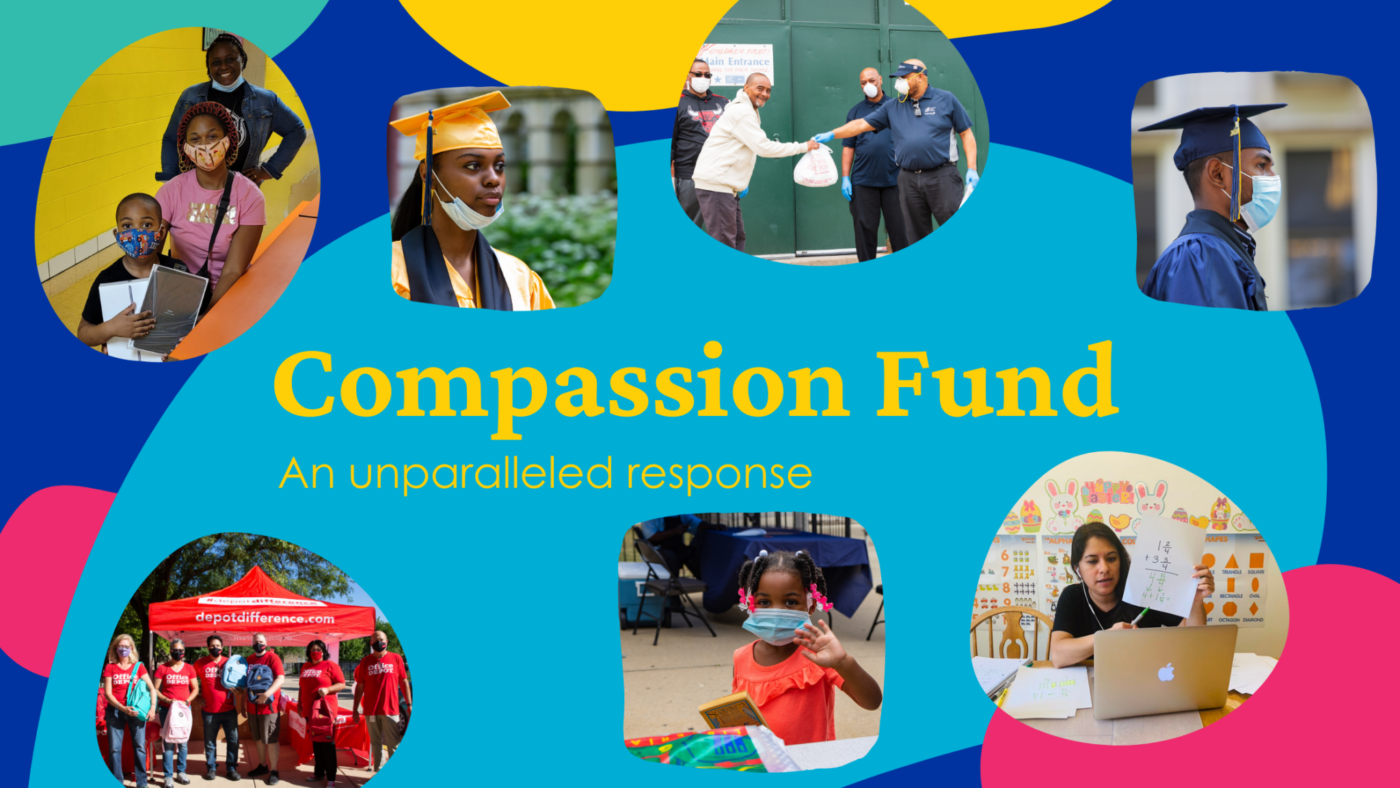
In unique circumstances, our community has responded with extraordinary support. Throughout this tumultuous year, partners and supporters have rallied around CPS students. As part of CFF’s broader work on behalf of Chicago Public Schools, our Compassion Fund has raised over $11M for COVID-19 Crisis Response, plus millions more from in-kind donations. Resources contributed to the Compassion Fund provide direct emergency relief for schools and families.
An immense network has united in partnership, helping ensure CPS families are safe and supported – and that students are equipped to succeed despite changes to their learning environment. Since January 2020, Children First Fund has received support from over 1,200 individual and organizational donors. Donations reflect the diversity of our community of supporters, with contributions ranging from $5 to over $1M.
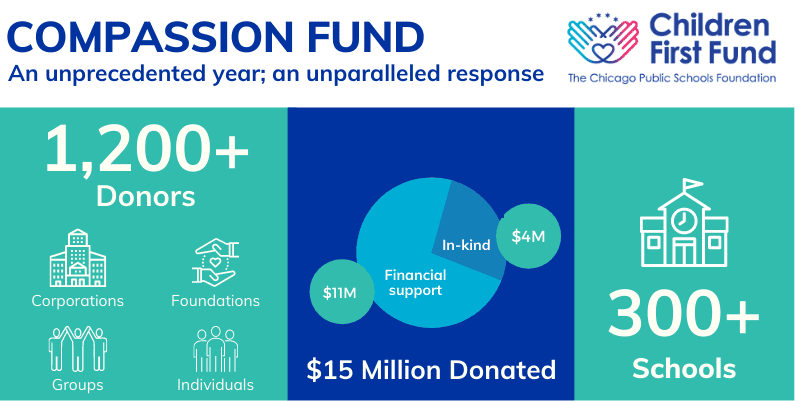
Students and families have long looked to CPS for support that extends beyond the classroom, particularly in times of crisis. That’s apparent this year more than ever. Amidst skyrocketing unemployment and a daunting public health emergency, CPS students have shouldered immense personal and family responsibilities – all while pursuing their own educations and adapting to dramatic changes in their learning environments.
Each day, Chicago’s dedicated school leaders and educators help their school communities process and deal with the pandemic’s sweeping impact. Alongside COVID-19, students have confronted numerous other crises, including increased national awareness about racial violence, civil disobedience, and waves of civic unrest. Innovative and empathetic as ever, Chicago’s educators offer their communities practical, mental, and emotional support.
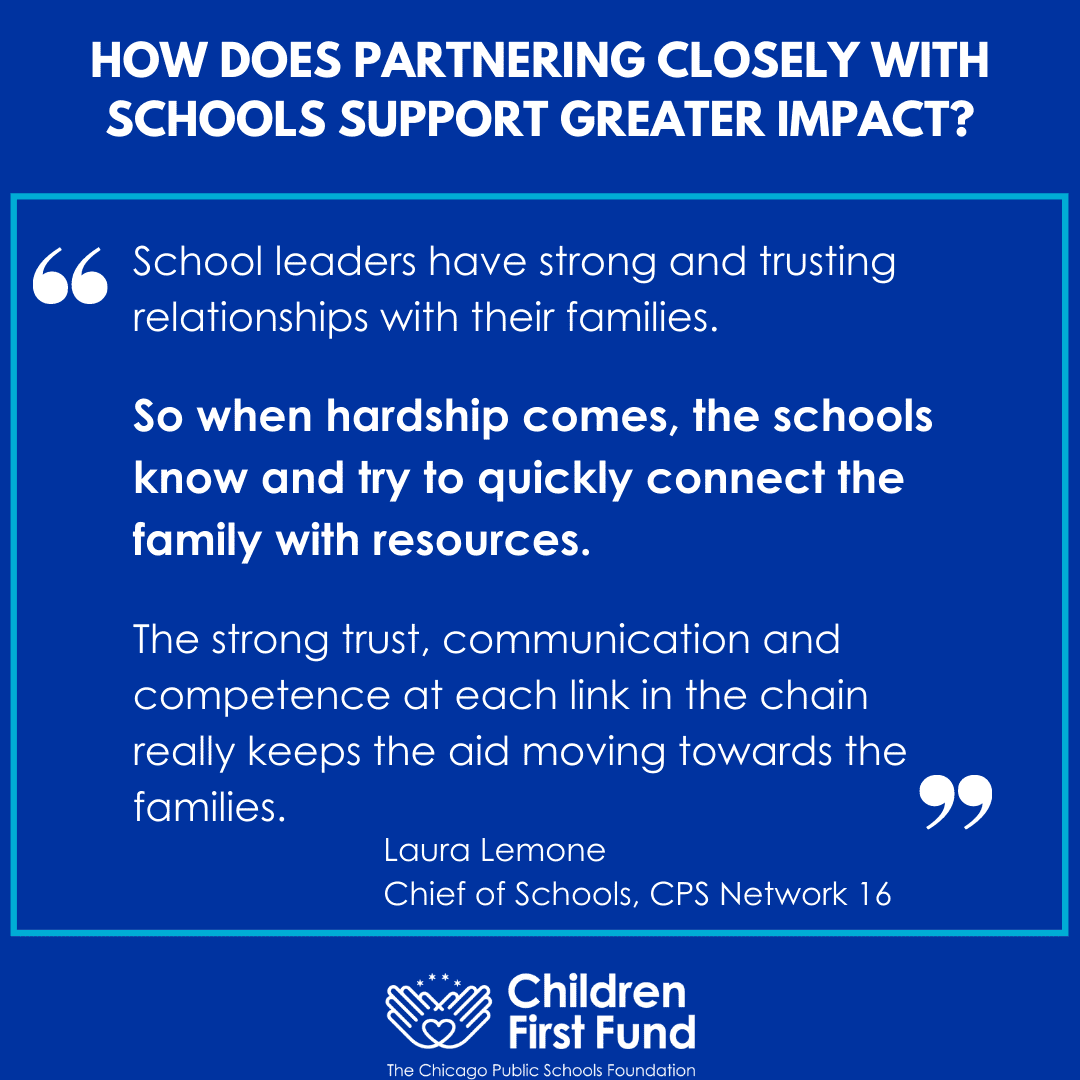
To meet acute, unpredictable needs with responsive, flexible funding, Children First Fund has collaborated with CPS principals throughout the pandemic to equitably distribute resources to hundreds of CPS schools. Established relationships with principals paved the way for school leaders to request support from the Compassion Fund throughout the crisis.
Laura Lemone, EdD and Chief of Schools for CPS’ Network 14, says she “appreciates the simplicity of the process” created for the Compassion Fund’s COVID-19 Response efforts, which she describes as a “godsend” for families in Network 14 experiencing “sudden — and, unfortunately, often multiple — challenges” throughout the extended crisis. She underscores the importance of leveraging school leaders’ strong and trusting relationships with families in their communities: “when hardship comes, the schools know and try to quickly connect the family” with the resources they need. And turnaround time is crucial, as families’ needs and situations can shift rapidly.
“We are very quickly able to gather referrals from schools and approve and distribute resources quickly,” continues Lemone. “A quick response of flexible aid can ensure families have groceries that week or their utilities stay on.”
With emergency relief that is both widespread and individualized, the Compassion Fund aims to help meet and ease the divergent, unpredictable challenges of our present moment. Distribution has prioritized support that empowers families to address their most pressing needs and meeting these needs in a responsive, equitable manner requires constant collaboration with school communities and their leaders. All along the way, it’s been resourced by an outpouring of generosity from our community of friends and supporters.
“The staff is going to be so excited and you better believe I will pull out all the stops. It is wonderful to know that someone is truly listening. In my 30 years of doing this work, this feels so refreshing and gives me something to look forward to as each new day presents its challenges. You guys are truly family.”
Principal Freeney, Kellman Corporate School, sharing about a staff appreciation grant to boost morale for essential workers
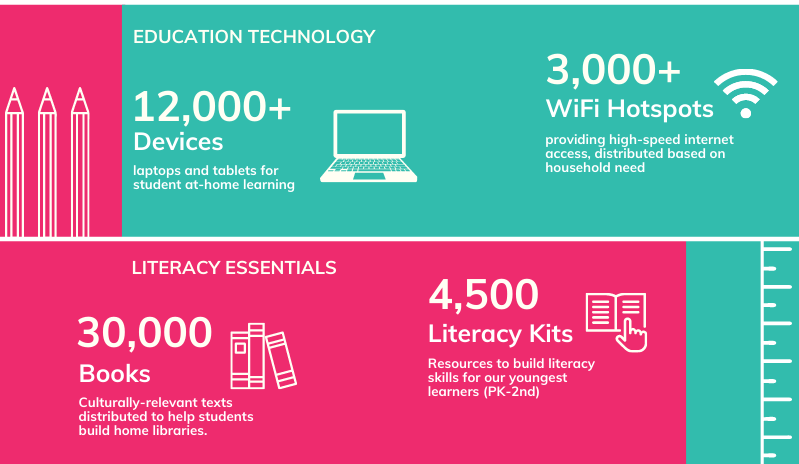 Through donations to the Compassion Fund, Children First Fund has been able to equitably distribute resources directly to hundreds of CPS school communities, including over 12,000 technology devices, 30,000 culturally relevant books, and 4,500 pre-K-2nd literacy kits. District-wide investments in Social-Emotional Learning (SEL) aim to help students process trauma and grief. Our partners’ support has brought Rainbows’ “Silver Linings” program into over 300 schools and trained 750+ educators, with additional trainings scheduled for early in 2021.
Through donations to the Compassion Fund, Children First Fund has been able to equitably distribute resources directly to hundreds of CPS school communities, including over 12,000 technology devices, 30,000 culturally relevant books, and 4,500 pre-K-2nd literacy kits. District-wide investments in Social-Emotional Learning (SEL) aim to help students process trauma and grief. Our partners’ support has brought Rainbows’ “Silver Linings” program into over 300 schools and trained 750+ educators, with additional trainings scheduled for early in 2021.
“Receiving this Chromebook will truly help my child to finish his 8th-grade year strong! I am very happy and pleased that Chicago Public Schools was able to make this happen.”
Parent, Ellington Elementary School
Aid has reached families and communities as well, with emergency financial relief of $100-$500 for over 1,000 families facing extenuating circumstances and microgrants given to 350 graduates from the Class of 2020 to ease their post-secondary transitions.

In preparation for the school year, our community of supporters united to equip CPS school communities for a year unlike any other. CFF equitably distributed resources, ensuring our students and schools had the resources to meet this historic moment.
Partners working with CFF through the Compassion Fund’s Back-to-School initiative supported CPS students in novel ways. They helped furnish dedicated home learning spaces with desks, tables, lamps, and other essentials. In addition to CPS’ massive distribution of learning technology, hundreds of students received new headphones to help them focus and engage while learning at home.
The monumental Chicago Connected effort endeavors to empower over 100,000 of our neighbors with internet access. Partner initiatives have supported Child Learning Hubs for families of essential workers. Through aid to the District’s meal distribution efforts, our supporters have provided tens of millions of meals for Chicago families.
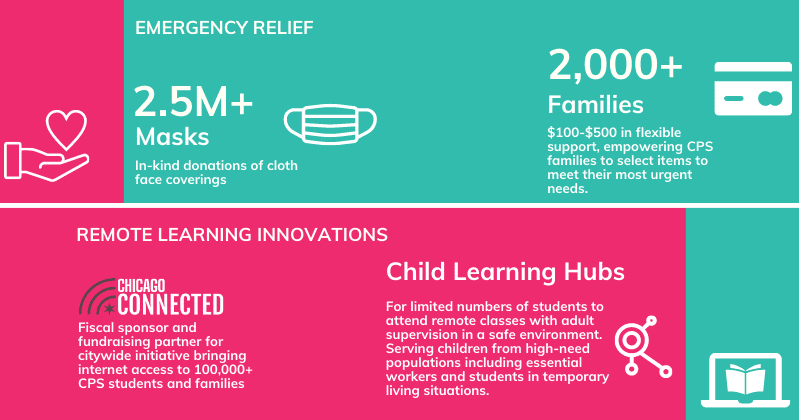
Tangible donations like these have been critically important. But it is impossible to overstate the power of intangible support from our community. CPS students, teachers, and staff know that their neighbors and their city is supporting them through this difficult time. We are truly grateful to the companies, foundations, institutions, and individuals who have rallied together to lift up our school communities.
With this support, our CPS students have shown their resilience. They have been busy: charting courses for higher education and STEM careers, innovating ways to put others first, and advocating for justice and equality around the world.
During the pandemic, the Compassion Fund has helped bring practical support and encouragement to thousands of students and families across our city. Flexible emergency relief has empowered CPS schools and principals to the heightened needs of their student body–fostering community, boosting morale, and helping students continue learning. And, although they’ve often been concealed behind face masks (including in-kind donations of more than 2.5 million cloth face coverings from CFF partners), we’ve seen an inspiring growth in another essential resource: smiles.
The Compassion Fund supports CPS students by allowing Children First Fund to act immediately when CPS families need us the most. When the COVID-19 pandemic forced schools to move to remote learning, our community responded with an outpouring of generosity. Record numbers of support went to students for computers and headphones connectivity, remote work desks and early reading kits, multicultural books, meal distribution and food delivery, SEL wrap-around services, direct family relief and more.
Moving forward, immense needs persist in our school communities. Whether students move to in-person learning or remain in remote learning, the pandemic continues to have a pronounced impact on the life circumstances and educational needs of our students. While exacerbated by the current public health crisis, most of the needs addressed by the Compassion Fund existed long before the pandemic.
We’ve seen this past year how rapidly our circumstances can shift. In an unpredictable environment, flexibility is crucial for rapid responses to emergent needs. Through our partners continued investments in the Compassion Fund, CFF is positioned to provide precisely this kind of support to Chicago’s students.
To those in the Chicagoland area and beyond who have given with such enthusiasm and compassion, thank you for joining us! Your continued partnership is vital to addressing systemic, local, and individual issues and fulfilling CPS’ Mission, providing a high-quality public education for every child, in every neighborhood, that prepares each for success in college, career, and civic life.
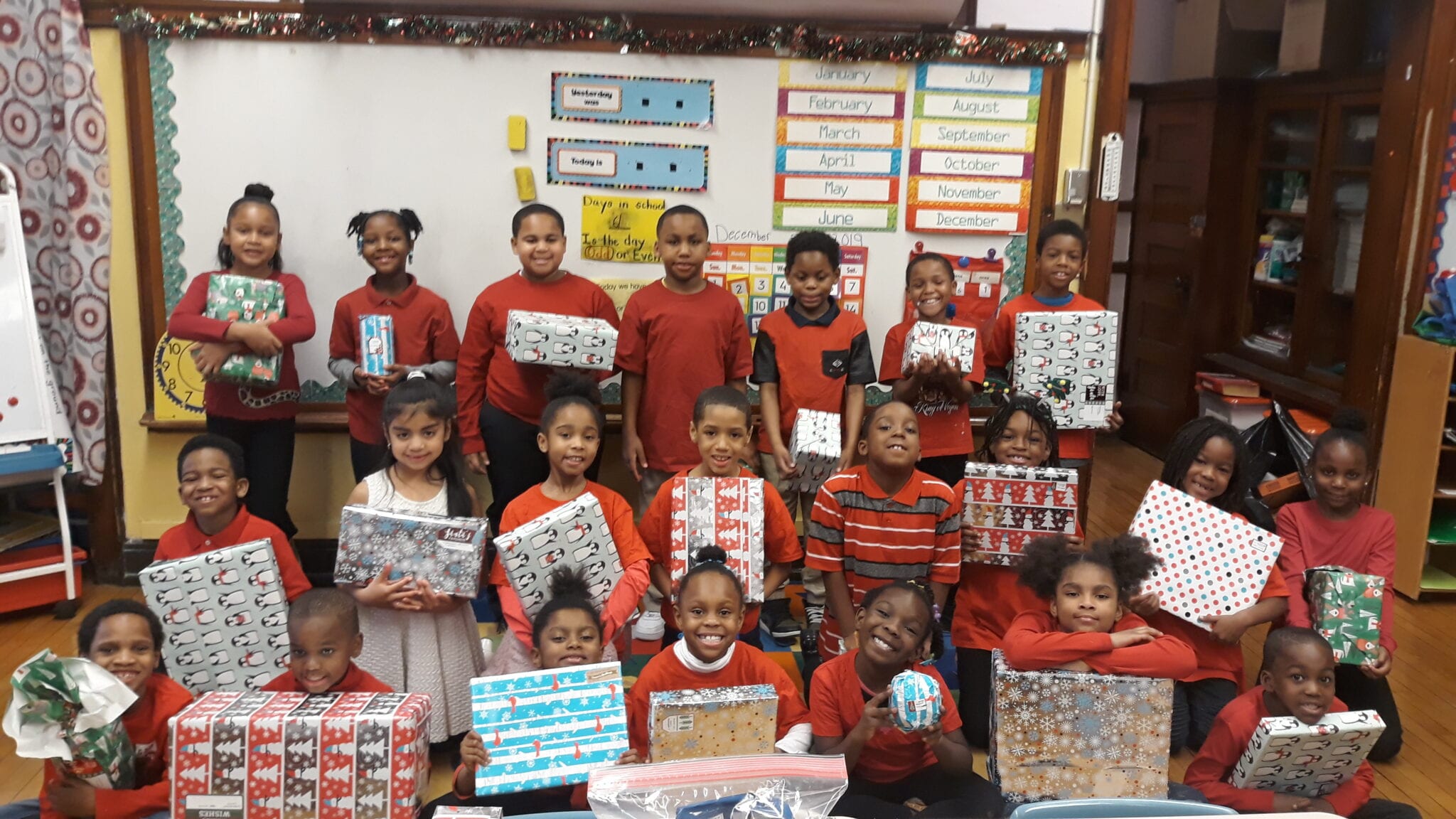
In November of 2019, Children First Fund introduced a new holiday tradition called CPS Santas: Gifts That Make a Difference. The campaign, which called on people, businesses, and organizations across Chicago to become CPS Santas, brought together both new and longtime CPS supporters to provide gifts and support that directly impacted Chicago Public School students over the holiday season.
 CPS Santas offered four giving options, including both in-kind and monetary donation options for both groups and individuals. Each of those giving options was designed to provide direct supports to CPS students in need.
CPS Santas offered four giving options, including both in-kind and monetary donation options for both groups and individuals. Each of those giving options was designed to provide direct supports to CPS students in need.
The Compassion Fund option raised money to support CPS families experiencing deaths or other crises, the Warm Winter Coats option collected winter items for students in need, the Multicultural Books option collected books and funding for books that highlight diverse characters and experiences for classroom libraries, and the Toys for the Holidays option asked teams and offices to buy gifts for students who might not otherwise receive any.
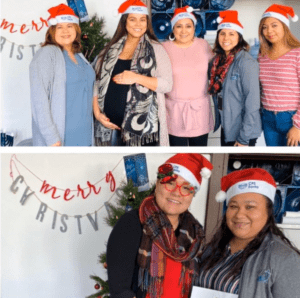
Word of the CPS Santas campaign spread quickly on social media thanks to donors who proudly posted pictures of their CPS Santa hats, sent to every donor who contributed $25 or more, which included the vast majority of donors.
CFF supporters required little convincing to get engaged. In just the first two weeks of the campaign, more than 100 donors, including both groups and individuals, had made contributions to one or more of the four giving options. By the campaign’s end on December 31, that number more than doubled.
In addition to CPS Santas’ four giving options, Children First Fund also celebrated Giving Tuesday on December 3 by encouraging donors to support CPS teacher fundraising projects through DonorsChoose. Thanks to an anonymous supporter who matched every donation made to CPS donation pages that day, our supporters raised more than $130,000, fully funding 214 separate CPS teacher projects in a single day.
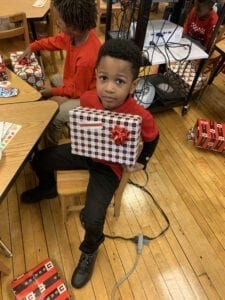 Among the hundreds of donors who participated in CPS Santas this year were a number of office teams and community organizations who pooled their resources to make larger gifts to CPS classrooms.
Among the hundreds of donors who participated in CPS Santas this year were a number of office teams and community organizations who pooled their resources to make larger gifts to CPS classrooms.
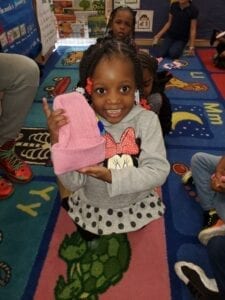
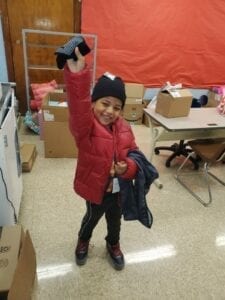
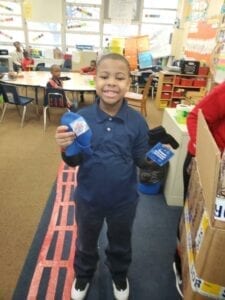
Of course, teams and individuals within CPS participated as well, including the Talent team, who provided personalized gifts for the 1st grade at Neil Elementary, and the Grant Funded Programs team, who provided 115 $25 Target gift cards for every student at two CPS alternative schools.
But numbers only tell part of the story. The real impact is best expressed by the people affected by these generous donations.
Dr. Heather Hampton, the principal at Dett, invoked one of the greats to help express her gratitude toward her donor: “Maya Angelou said ‘people will forget what you said, people will forget what you did, but people will never forget how you made them feel.’ You really made our students feel cared for and loved. Thank you!”
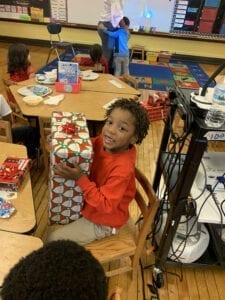 “We are so appreciative of the generous donations,” said Kamilah Hampton, principal at Daley. “My kids are extremely appreciative of the support.”
“We are so appreciative of the generous donations,” said Kamilah Hampton, principal at Daley. “My kids are extremely appreciative of the support.”
“[You provided] a magical Christmas for my students at Nash,” principal Marcie Byrd told her donors. “They received many wonderful gifts, and you blessed many children who may not have otherwise received any gifts this Christmas.”
“I wish you could see the joy on their faces,” said DuBois principal Vanessa Williams-Johnson. “Your kindness if what the world needs more of.”
 These sentiments express just how vital every donation made through CPS Santas was. Each and every one of them directly affected students, either by providing crucial supports or gifts to lift their spirits over the holidays. These were gifts that truly made a difference.
These sentiments express just how vital every donation made through CPS Santas was. Each and every one of them directly affected students, either by providing crucial supports or gifts to lift their spirits over the holidays. These were gifts that truly made a difference.
To the hundreds of people who became CPS Santas this year, we thank you. Each of you should feel immense pride in the impact you made. We can’t wait to work with all of you and many more new CPS Santas next year to provide more gifts, more books, more coats, hats, gloves, and scarves, and more support to more students across the district.

From all of us at CFF to every CPS Santa across Chicago, thank you!